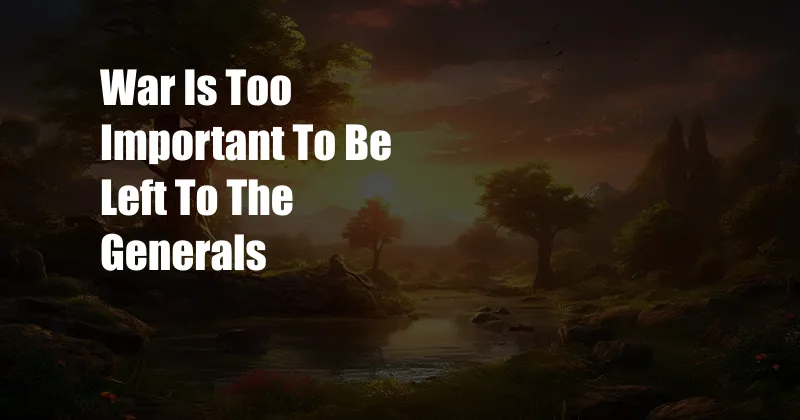
War Is Too Important to Be Left to the Generals
In the labyrinthine realm of war, where strategies intertwine and lives hang in the balance, it is tempting to entrust the fate of nations to the sagacious minds of generals. Yet, history has repeatedly demonstrated the fallacy of such a surrender, revealing that war is a human endeavor too complex and far-reaching to be left solely in the hands of military commanders.
We must recognize that war’s consequences extend far beyond the battlefield. Its tendrils reach into the fabric of society, shaping destinies and leaving lasting scars. It is a catalyst for social upheaval, economic devastation, and the erosion of human rights. Therefore, it is imperative that decisions regarding war are made with the broadest possible perspective, incorporating the wisdom and insights of civilians, politicians, and other stakeholders.
The Perils of Military Dominance
Isolation from Reality
Generals, by the very nature of their profession, are immersed in the military culture. This immersion can lead to a distorted perception of civilian life and the consequences of war on societies. Insulated from the daily realities of civilian existence, they may underestimate the human cost and suffering that war inflicts.
Limited Perspective
Military training emphasizes obedience, discipline, and a narrow focus on strategic objectives. While these qualities are essential for battlefield success, they can hinder the ability to consider the broader implications of war. Generals may struggle to grasp the political, economic, and social complexities that shape conflicts.
The Need for Civilian Oversight
Balancing Perspectives
Civilian leadership provides a vital counterbalance to the military perspective. Civilians bring a wider range of experiences and expertise to the decision-making process, ensuring that war is not pursued solely for military gain but is aligned with broader national and humanitarian objectives.
Democratic Accountability
In a democracy, it is the people who bear the ultimate responsibility for the decisions that lead to war. Civilian oversight ensures that military actions are subject to public scrutiny and accountability. This helps prevent the abuse of power and protects citizens from unnecessary or unjustified military engagements.
Expert Advice and Tips
Engage in Diplomatic Efforts:
Before resorting to war, exhaust all diplomatic avenues. Diplomacy provides a peaceful means of resolving conflicts and can prevent unnecessary bloodshed and suffering.
Consider Long-Term Consequences
Weigh the potential benefits of war against the potential risks and consequences. Consider not only the immediate military objectives but also the long-term effects on human life, societies, and the environment.
Seek International Cooperation:
Collaborate with other nations to build consensus and garner support for peaceful solutions. International cooperation can help prevent conflicts from escalating and can provide resources for post-conflict reconstruction.
Frequently Asked Questions
Q: Why is it important to involve civilians in war decisions?
A: Civilians provide a broader perspective, ensure democratic accountability, and can prevent military domination.
Q: What are some tips for making wise war decisions?
A: Engage in diplomacy, consider long-term consequences, and seek international cooperation.
Conclusion
War is a profoundly human endeavor, but it must not be left to the sole discretion of generals. By integrating civilian oversight, we ensure that the decision to wage war is made with the utmost care and consideration, balancing military objectives with broader societal and ethical concerns. Only through such a collective approach can we hope to prevent the horrors of war and build a peaceful and just world.
Call to Action
Join the conversation on war and peace. Share your thoughts, engage in discussions, and let us work together to create a future where war is not the default solution to conflict.